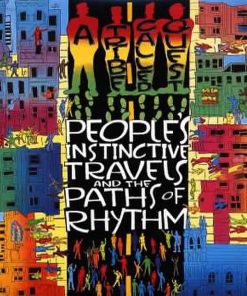2019 repress. Very limited double-LP bundled version of the two individual LPs, 180 gram color vinyl. Includes printed inner, Nagaoka anti-static record sleeve, plus and Obi-style insert in a fold-out outer sleeve. Only a handful of years ago, the name Julius Eastman would have been met by a unanimous blank look. The legacy of this once-darling of the New York post-minimal avant-garde had, since his untimely death at the age of 49, in 1990, been almost entirely lost. Eastman’s story is as fascinating as they come: black, angry, and queer in an all too polite, straight white musical world. A prodigy and genius whose music took him to astounding heights, whose unwillingness to conform and play by the rules took him down the path of drug abuse and homelessness, as well as the loss of his scores. Even before his death, he was already a forgotten name. Eastman belongs to a generation of composers who inherited the mantel left by minimalism, but despite being highly respected by his peers, he was given few chances to record his work, relegating most of his talent as a singer and pianist to the realization of others’ work. It was Eastman who conducted the iconic recording of Arthur Russell’s Tower of Meaning, and whose piano cuts its way across the 1976 recording of Morton Feldman’s For Frank O’Hara. It’s likely that Eastman’s work would have been entirely lost, had it not been for rigorous efforts of a few close friends, the most persistent of whom was the composer, Mary Jane Leach, who spent years tracking down his lost scores. These efforts eventually led to the comprehensive CD collection, Unjust Malaise (2005). It was the beginning of a turning tide, and over the 13 years since, Eastman’s singular voice has slowly returned to the audience he always deserved. It also represented the recorded debut of some his most thrilling and controversial work, three compositions for piano from what he called the N*gger Series: Gay Guerrilla, Evil N*gger, and Crazy N*gger. The three pieces are now issued across two LPs in their first-ever vinyl release with extensive liner notes by Leach and Bradford Bailey. These three seminal works by one of the most important, but neglected, American composers of the 1970s and ’80s, return to the light once more. Not only are they an entire rethinking of musical minimalism, but they ferociously blow the doors off of what classical music can be. Mastered by Giuseppe Ielasi. All three compositions on these 2 LPs are for piano quartet: Performed by: Frank Ferko, Janet Kattas, Julius Eastman, Patricia Martin. Recorded 1979/80.
Fast Shipping and Professional Packing
We offer a broad range of shipping options due to our long-running partnerships with UPS, FedEx and DHL. Our warehouse employees will pack all goods to our exacting requirements. Your items are carefully inspected and secured properly prior to shipping. We ship to thousands of customers every day from all over the world. This demonstrates our dedication to becoming the largest online retailer in the world. Warehouses and distribution centres can be located in Europe as well as the USA.
Note: Orders that contain more than one item will be assigned a processing date depending on the item.
We will carefully examine all items before sending. Today, the majority of orders will be shipped within 48 hours. The expected delivery time will be between 3 and 7 days.
Returns
Stock is dynamic. It's not completely managed by us, since we have multiple entities, including the factory and the storage. The actual inventory can fluctuate at any time. It is possible that the stocks could be depleted after your order has been processed.
Our policy lasts 30 days. If you haven't received the product within 30 days, we're not able to issue a refund or an exchange.
To be eligible for a refund the product must be unopened and in the same state as when you received it. The item must be returned in its original packaging.
Related products
Vinyl
Vinyl



































